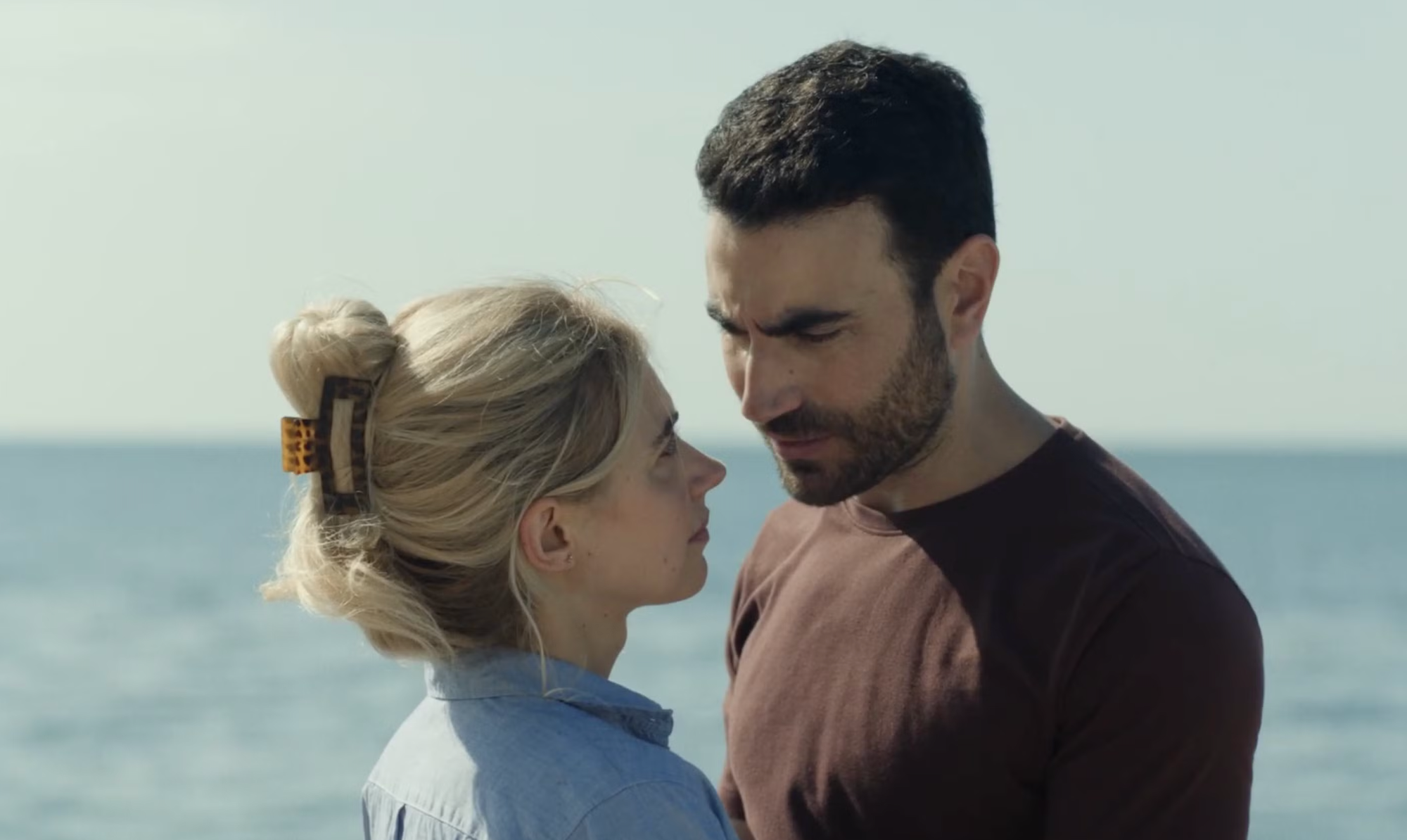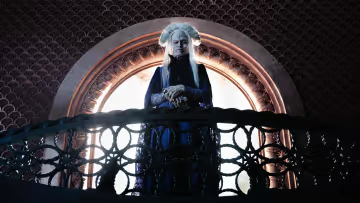In Review: ‘One Battle After Another,’ ‘All of You’
Paul Thomas Anderson comes through with the perfect movie for our times. Brett Goldstein and Imogen Poots come through with a movie on Apple TV+.

One Battle After Another
Dir. Paul Thomas Anderson
162 min.
It seems almost absurd to live through these volatile, fractious times and rarely see filmmakers nod to the elephant in the room, if only to make any connection at all between what’s on screen and what our shared reality is actually like. Yet when Ari Aster attempted it earlier this year with Eddington, a dark political comedy about a town gone mad during the COVID-19 epidemic, it felt at times like staring directly into the sun, feeling so blinding (and unpleasant) that any perspective was hard to come by. (It may well look much better in the future, though, as an essential time capsule.) Paul Thomas Anderson’s sensational One Battle After Another cracks the code by channeling the present without engaging with it directly, so the themes and references are completely of-the-moment without stepping in the sticky tar of docudrama. It’s a film about immigration enforcement, white supremacy, tribalism and shaggy networks of resistance, but it glides thrillingly above the bog.
The Reveal is a reader-supported newsletter dedicated to bringing you great essays, reviews and conversation about movies. If you are not paid subscriber, we would love for you to click this button below and join our community.
Though his film opens roughly a couple decades before the present, Anderson collapses the timeline a little in a propulsive sequence that finds members of the “French 75,” a scrappy unit of leftist revolutionaries, freeing immigrant detainees from an outdoor facility that looks uncannily familiar. Sweeping through chainlink cages where migrants are swathed in mylar blankets, Perfida Beverly Hills (Teyana Taylor) leads the operation with a catwalk bravado that’s undeniably sexy. How sexy? The Army colonel in charge of the facility, the aptly named Steven J. Lockjaw (Sean Penn), cannot suppress the erection he gets from witnessing it. Meanwhile, Perfida’s husband, an explosives expert known now as “Ghetto Pat” and later as Bob Ferguson (Leonardo DiCaprio), waits on the perimeter to make good on his part of the plan. The fates of all three characters will soon be linked in a tragicomic love triangle.
The extensive prelude to One Battle After Another leads to the fracturing of the French 75. Lockjaw and Perfida’s relationship, a combination of perversion and coercion, leads her into witness protection while Bob hides out under a new identity with their newborn daughter Willa. That leaves the bulk of the film to the present day, roughly 15 years later, with Bob in full Jeffrey Lebowski burn-out mode and Willa (Chase Infiniti) generously accepting his approximation of fatherhood. (A scene where Bob tries to get his head around “they/them” pronouns is almost sweetly hilarious, in that he both means no harm and genuinely doesn’t get it.) Yet past threats resurface with a breathtaking swiftness that upends Bob and Willa’s life in an instant, with Bob reconnecting with his underground hippie network (and a local “sensei,” played with laidback finesse by Benecio Del Toro) and Willa getting whisked off to safety by Deandra (Regina Hall), a former comrade.
That’s a lot of information to process about weird subcultures and conspiratorial connections, which would connect One Battle to Another to Anderson’s Inherent Vice even if both films weren’t rooted in Thomas Pynchon novels. (This one takes inspiration from Pynchon’s Vineland, but isn’t by any means an adaptation.) But where the earlier film was content to marinate in drugged-out, shaggy-dog SoCal vibes, One Battle After Another jams the accelerator, with Anderson uncorking huge setpieces without losing track of his eccentric characters and the strange, sinister, at times invigorating world they occupy. This is Anderson’s best approximation of a mainstream political action-comedy and he proves that he can work on that scale while remaining wholly himself.
The sights on this magical mystery tour include a lot of familiar signposts, especially in the nativist push to terrorize persons of color—Lockjaw, in particular, is a recognizable type of meathead sociopath—but One Battle After Another is plugged into an off-the-grid America where resilient communities flourish and defend their own. At the same time, it continues a running Anderson theme about flawed fathers, with DiCaprio’s Bob showing flashes of nobility whenever he’s not scrambling fecklessly to get his bearings. (Being a revolutionary is truly for the young.) There’s great comedy in the adventures of a washed radical forced back to life, but One Battle After Another is a serious film, too, about the true multicultural fabric of America and its resiliency under duress. The title may suggest exhaustion, a fight that never ends, but on the other side of that, Anderson firmly asserts that the fight is never lost. — Scott Tobias
One Battle After Another opens at theaters everywhere tonight. See it as soon as possible in the best of whatever format is available to you.


All of You
Dir. William Bridges
98 min.
What if a just-beyond-the-horizon technological breakthrough made it possible to take a test that, using cutting-edge science, would reveal your one true soulmate to you? What if this proved so successful and became so widely adopted that those who didn’t take the test start to feel a bit like outcasts? And what if you did take the test, made an excellent match, yet still wanted more? Those are the sort of Black Mirror-esque questions that play out in the background, often deep in the background, of All of You, a romantic drama directed by William Bridges (making his feature debut) and co-written by Bridges and Brett Goldstein (Ted Lasso, Shrinking), who co-stars as Simon, one half of a couple that seems destined never to be thanks to science saying they don’t belong together.
Imogen Poots co-stars as Laura, a Londonder who, as the film opens, has decided to let the tech firm Soul Connex find her perfect match. For emotional support (and a bit of financial support, too), Laura brings Simon, her best friend since college, along to the testing facility. Along the way, he jokes about how everyone they know who’ve tried Soul Connex have disappeared into two-person cocoons never to be seen again and how this is sure to happen to Laura, too. Except he’s not really joking. It’s obvious to everyone but Laura, and maybe even to her, that Simon’s in love with her and she has feelings for him that all the teasing and layered irony they use to communicate with one another can’t hide. Nonetheless, she presses on and finds happiness with Lukas (Steven Cree), an amiable Scotsman who, based on all available evidence, does seem kind of perfect for her.
It’s at this point that All of You’s science fiction concept more or less fades away and the film becomes a familiar drama of yearning and forbidden love, albeit one played with enough sincerity and easy chemistry to stay reasonably compelling for a while. The film periodically checks in with Simon and Laura in the years after Laura takes the test. (Goldstein’s changing facial hair marks the passage of time.) They stay close, at least at first. In one of the film’s best scenes, Laura turns to Simon in Lukas’s absence to drive her to the hospital while she experiences a miscarriage, knowing that there’s no one else she trusts more and barely hiding her regret when Lukas arrives and Simon has no reason to stick around. But a weirdness sets in as it becomes increasingly clear to both that Laura’s perfect marriage hasn’t made their unresolved feelings disappear.
Goldstein and Poots play off each other well, creating the sense of a years-deep connection that’s suddenly threatened by what’s changed between them, but also by what’s remained the same. They’re convincing as two people who don’t know what to do. Unfortunately, they’re stuck in a movie that also doesn’t really know what to do, so it pulls them through some predictable trials and every once in a while remembers that it started out as an intriguing attempt to use science fiction to explore a question about soulmates, or the absence thereof, at least as old as Plato. Then it drops it again in favor of kissing, tears, and the other expected business. —Keith Phipps
All of You debuts on Apple TV+ tomorrow.





Discussion